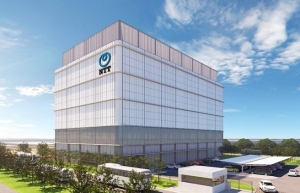New data centres popping up in Vietnam’s major cities
In August, the $65 million CMC Data Centre Tan Thuan in Ho Chi Minh City was opened at Tan Thuan Export Processing Zone. It is both a data centre and the most modern and secure cloud computing infrastructure in Vietnam, meeting international standards and business needs.
 |
| Data centre market value is set to grow at nearly 15 per cent annually until 2026, Photo: Shutterstock |
Luu Danh Anh Vu, director of the Solution Consulting Centre of CMC Telecom, said that the new data centre owns Uptime Tier III certificates for both design and construction.
“As a modern data centre, CMC Data Centre Tan Thuan has the ability to connect and provide the best service for businesses with a system of 1,200 high-capacity network cabinets of up to 20kw/rack over an area of 10,000 square metres,” Vu noted.
Amazon in March announced that it would choose Hanoi as one of 10 locations to build 10 data centres in six Asia-Pacific countries. This local mega data centre will better serve local customers and can help Amazon strengthen its position in the region. The timeline for such a venture has not yet been revealed by the company.
NTT Telecommunications Group from Japan also has a similar plan. In April, the group announced an investment of $56 million to build a standard data centre in Saigon Hi-Tech Park. This will be the largest standard data centre in Vietnam when completed in 2024, NTT said.
Yasuo Suzuki, CEO of NTT, said that the facility will provide high-quality data centre services for domestic and foreign enterprises and organisations such as server leasing, support and remote management, and cloud computing.
Meanwhile, Gaw Capital Partners from Hong Kong has completed the first phase investment in a Level 3 Data Centre development project located in the same park in Ho Chi Minh City. This is the first investment of Gaw’s Pan-Asia development platform.
Vo Sy Nhan, co-founder and CEO of joint venture Gaw NP Capital, said that Vietnam exhibits powerful macroeconomic trends and strong demand for internet data centres.
“Vietnamese businesses are now more aware of the role of digital technology in their production and business activities, which will drive the growth of digital transformation and data usage. As the master developer, we are confident about the data centre sector in Vietnam and look forward to seeing the completion of this project, which is located in our integrated business park, by 2024,” Nhan said.
Viettel also claims to be building the largest data centre in the country, when in April it announced VND6 trillion ($260 million) of funding for a facility in Ho Chi Minh City. Viettel said it would be its sixth data centre in Vietnam, with two already built in Hanoi, one in Danang, and two others in Ho Chi Minh City. All six were put into operation in 2014.
A February report on the data centre real estate market from Savills Vietnam said that the domestic data centre market value was reported to be at $858 million in 2020 and forecast an average growth rate of more than 14 per cent per year until 2026, showing the potential of this field.
Currently, there are many technologies and telecommunications investors from the Americas, India, and Japan who have a need to rent land or buildings to build and develop data centres of international standards at levels 3 and 4, with an area of 10,000-30,000sq.m, around major cities, said Savills.
Associate Dr. Tran Minh Tuan, deputy director of the Institute of Information and Communications Strategy under the Ministry of Information and Communications (MIC) said that Vietnam currently has 27 data centres located in the nation’s biggest cites, helping to capture the needs and standards of all different types of businesses.
“Digital hub regional data centres are recommended to be located in the major financial centres of the region and Vietnam should build a variety of cloud computing services with the new trend of multi-cloud services to serve the business community,” Tuan added.
According to the MIC, with a vision for the 2025-2030 period, Vietnam will develop two national data centres serving large-scale digital government, one national data centre, and three regional data clusters to serve the development of the digital economy and digital society, as well as two local data centres for regional and international financial hubs.
This system is to ensure that all government agencies use cloud computing, and 70 per cent of Vietnamese businesses use cloud computing services provided by suppliers in Vietnam.
 | More Singapore firms develop new data centres in Vietnam Singaporean businesses are increasingly investing in new data centres in Vietnam to serve the rising demand for data storage solutions in Vietnam. |
 | Data centres mark new digital stage Domestic and international investors are increasingly turning to alternatives in the Vietnamese market such as data centres and self-storage services to diversify their portfolios and enhance return. |
 | Google launches third data centre in Singapore Tech giant Google has launched its third data centre in Singapore on August 23, bringing its total investments in such facilities in the Southeast Asian nation to 850 million USD. |
 | Data centres in Vietnam: an investment goldmine In 2016, Vietnam was already described as Southeast Asia’s Silicon Valley. Its emerging sectors and fast-growing industries included fintech, telecommunications, electronics and computer manufacturing, and information and telecommunications services. Now, the country is one of the fastest-growing digital economies in Southeast Asia and on track to reach an internet economy worth $57 billion by 2025. |
What the stars mean:
★ Poor ★ ★ Promising ★★★ Good ★★★★ Very good ★★★★★ Exceptional
 Tag:
Tag:
Related Contents
Latest News
More News
- Vietnam suspends tours to Iran and Israel amid conflict (March 04, 2026 | 09:21)
- US-Iran conflict affecting asset prices (March 04, 2026 | 09:17)
- Insurers weather Q4 shock to deliver solid growth (March 04, 2026 | 09:16)
- Industrial real estate enters new cycle (March 03, 2026 | 15:17)
- Levanta acquires 80 per cent stake in 50MW Gia Lai wind farm (March 03, 2026 | 11:58)
- JAPEX withdraws from LNG terminal project in Haiphong (March 03, 2026 | 11:57)
- YADEA launches $100-million smart manufacturing plant in Bac Ninh (March 03, 2026 | 11:55)
- Middle East tensions set to test VN-Index, boost energy stocks (March 02, 2026 | 17:15)
- Agency of Foreign Trade warns of trade disruption due to Middle East conflict (March 02, 2026 | 17:11)
- MoF moves to expand farm insurance support and eligibility (March 02, 2026 | 16:54)






















 Mobile Version
Mobile Version